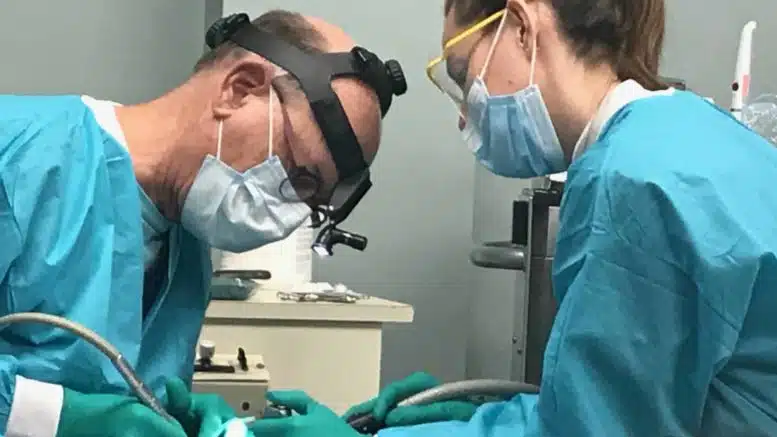By Anne Blythe
Few would fault Bill Milner if he decided it was time to slip out of his scrubs and retire from dentistry, then go off and travel the world.
At age 73, he has been tending to teeth in North Carolina for nearly half a century. He has been honored by his peers. In January, the American Dental Association Board of Trustees bestowed upon him the 2023 ADA Humanitarian Award.
Yet if you check in with Milner, he talks excitedly about his vision for expanding the mobile dentistry nonprofit he started 23 years ago.
With portable dental chairs and equipment in vans, teams of dentists, hygienists and assistants from Access Dental Care fan out across a 33-county area from Morehead City to Murphy to offer oral health care to special needs populations.
Some of their patients are immunocompromised. Some have behavioral challenges. Others are older people with mobility challenges who need dentists and hygienists to come to them.
Milner, who is passionate about public health, spent the early part of his career caring for children in clinics he helped set up through the Randolph County public health department and the state health department’s oral health division.
Those experiences led him to see the other side of the age spectrum and how many elderly people, especially those in nursing homes, could use better and more consistent oral health care.
Milner had a bit of an epiphany in the late 1970s while traveling in England, where he saw that dentistry was part of nursing home care. Furthermore, dentists there in private practice made house calls to fit older patients with dentures.
He returned to North Carolina and began to build a business model that would work here. That’s when Access Dental Care, based in Asheboro, started setting up mobile clinics.
Lessons from Great Britain
What started in just 12 facilities has grown to providing care to 150 facilities in 33 counties across the state — from the mountains to the coast.
Access Dental also helps people in their homes.
The idea is that oral health care should not be an afterthought, especially for seniors who often get little dental coverage through Medicare.
A Kaiser Family Foundation issue brief written in 2019 found that 47 percent of Medicare beneficiaries had no dental coverage. Although some Medicare recipients have Advantage Plans with additional coverage, premiums and copayments often are out of financial reach, making dental care unaffordable.
That same study showed that 47 percent of Medicaid beneficiaries did not visit a dentist that year. When broken down by race and ethnicity, the data showed that 68 percent of Black Medicare beneficiaries did not see a dentist that year, and 61 percent of Hispanic beneficiaries were in the same boat.
Bridging coverage gaps
Milner believes that some of those disparities can be bridged by bringing dental services to the people rather than expecting them to get to clinics and care provided in university settings that often can be difficult to navigate.
Last year, the New Hanover County board of commissioners agreed to spend hundreds of thousands of dollars to set up a joint program with Access Dental Care. The target is county residents who are 55 and older and with incomes at or below 200 percent of the federal poverty level — a group that could include as many as 20,000 residents.
Lack of oral health care can have significant consequences for overall health. Some might find it difficult to eat and chew solid foods, creating nutritional problems that can lead to larger troubles. Periodontal disease often is linked to systemic health problems such as heart disease, diabetes, kidney problems and cancer.
“They wanted a mobile program,” Milner said recently. “It has been an incredible experience. Now we are serving folks in the community who have not had a chance to get care before.”
Building a model for others
Programs such as the one set up in New Hanover County show why Milner was selected for the 2023 ADA Humanitarian Award.
“He has spent his 40-plus years in organized dentistry working toward oral health equity, providing care to those most in need,” ADA President George R. Shepley said at the time. “Patients with disabilities, those in nursing homes and even patients with infectious diseases like HIV/AIDS are receiving care that might not always be available otherwise.
“Dr. Milner and his staff’s dedication is epitomized by the fact they are being proactive about meeting the needs of seniors and those with special health needs, while at the same time inspiring early-career dentists and dental students in North Carolina to follow his lead.”
Inspiring early-career dentists is one of the reasons that Milner has no plans to retire yet.
If given a magic wand, Milner said he would wave it with a vision for the next 10 years that includes setting up more training opportunities through Access Dental Care that bring dental students through rotations in the mobile clinics. Eventually, he would like to see the North Carolina dental schools include training for special needs populations and mobile dentistry.
“I want to establish a specific residency program and give them just a little taste while they are in school,” Milner said.
Wanting to help special needs populations can often bring on a warm and fuzzy rush, Milner said. But then dental students begin to realize some of the difficulties that come with serving such needs.
It can take a special skill set, Milner said, and a unique understanding of what each individual needs just to get them to open their mouth long enough for a cleaning, extraction or other care.
What Milner finds rewarding, though, is that the dental profession and others are talking more about caring for the elderly and special needs populations.
He’s even gotten into the manufacturing of the mobile equipment for dental clinics on wheels like his.
“We’re not out to conquer the world,” Milner said of his team. “All we’re trying to do is care for the good folks of North Carolina.”









